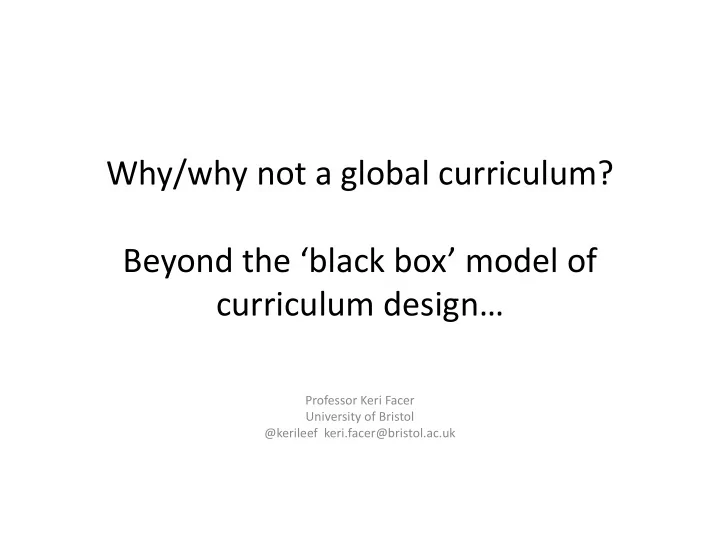

Why/why not a global curriculum? Beyond the ‘black box’ model of curriculum design… Professor Keri Facer University of Bristol @kerileef keri.facer@bristol.ac.uk
Two questions 1. ‘why global’? 2. ‘why curriculum’? � In favour � Against � A resolution?
SHOULD IT BE ‘GLOBAL’?
Why global ? � Education commits to prepare young people and societies to face the future � We have interconnected futures � Economic � Environmental � Demographic � Technological & Scientific � Networks – politics, sport, crime… � We need a curriculum that ‘enables young people to participate in the conversation society is having about its future’ (Bernstein/Young) and that conversation is now global
IN FAVOUR OF ‘CURRICULUM’
Why curriculum? � A curriculum distinguishes formal from informal learning � Not all knowledge can be acquired informally (e.g. STEM) � Informal learning can reproduce inequalities along gender, ethnicity, income, religious lines � Futures don’t just happen they are built – formalised education is a future-building process, an intentional effort to shape the future � A curriculum � Can act as the basis for entitlement for all young people to powerful knowledge � Offers structures for delineating formal from informal – aids enculturation � Acts as a clearly demarcated focus for debate about educational purpose and social futures
AGAINST CURRICULUM
Some risks – curriculum & thinking? � We need thinking children � Simply telling people what they have to learn doesn’t do much to prepare them to think for themselves � We need thinking teachers � Designing curriculum is critical to educators seeing themselves more than ‘delivery mechanisms’ � Curriculum’s relationship with assessment � Fragmentation of learning to measurable ‘outputs’ – extrinsic motivation & teaching to the test � Learning is opportunistic, momentary, responsive � Overlooks how learning actually happens – limiting opportunities to build on unanticipated learning – the book wizard
Some risks – curriculum and valuable knowledge � Accountability/ Representation � Who gets to decide which knowledge matters? On what basis? � Limited opportunities for local and emergent knowledge � Overlooks local knowledges – which may provide an important resource in uncertain times � It misses the ‘hidden curriculum’ anyway… � The other things that young people learn in school (relationships/ ways of interacting/ values) that may be more important in the long run (e.g. character)
One which recognises teachers and learners as agents One which recognises education as dynamic, not a ‘black box’ A DYNAMIC CONCEPT OF CURRICULUM IS REQUIRED
� “Education is the point at which we decide whether we love the world enough to assume responsibility for it and by the same token save it from that ruin which, except for renewal, except for the coming of the new and young, would be inevitable. “And education, too, is where we decide whether we love our children enough not to expel them from our world and leave them to their own devices, nor to strike from their hands their chance of undertaking something unforeseen by us, but to prepare them in advance for the task of renewing a common world.”
A curriculum for dynamic education � Rather than thinking of curriculum as: � A syllabus � Concerned with the body of knowledge to be transmitted (focus on the educator/canon – difficult to change) � A statement of a set of outcomes � Concerned with the development of performances (focus on the assessment of the learner – instrumental) � We might think of it as: � A set of principles to underpin dynamic action and interactions � A good curriculum provides – Principles for planning a course, studying it empirically, and considering grounds for its justification
The idea is that of an educational science in which each classroom is a laboratory, each teacher a member of the scientific community… The crucial point is that the proposal [curriculum] is not to be regarded as an unqualified recommendation but rather as a provisional specification claiming no more than to be worth putting to the test of practice, Such proposals claim to be intelligent rather than correct. (Stenhouse 1975: 142)
A curriculum for dynamic global education = A curriculum, like the recipe for a dish, is first imagined as a possibility, then the subject of experiment. (Stenhouse 1975: 4-5) � A set of principles … � For educators and societies to use … � To develop and test out programmes of activity … � that enable young people to participate in the global conversation about our future
To discuss � What makes a good recipe for education? � What sorts of assumptions about educators does it make? � What sort of principles would effectively underpin a programme for action and experimentation by the educators who will make it ‘live’ in learning environments? � What sorts of approaches to experimentation could be adopted that go beyond the educators & the experts?
Recommend
More recommend